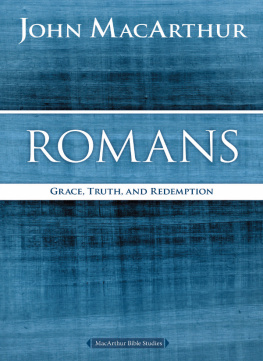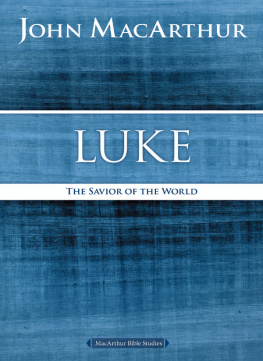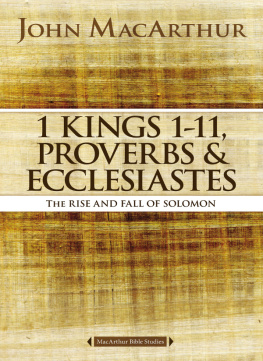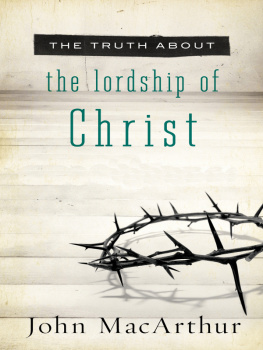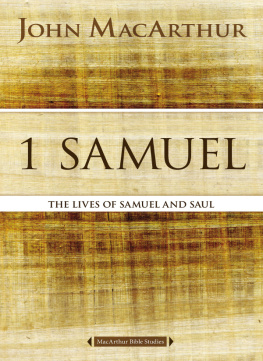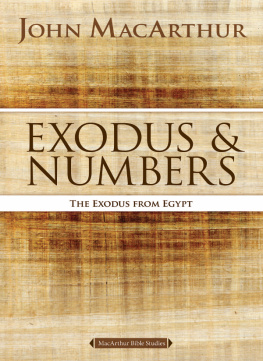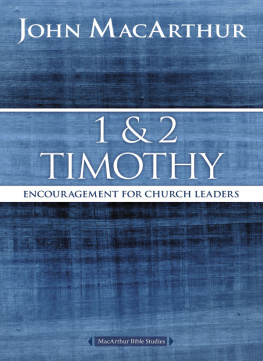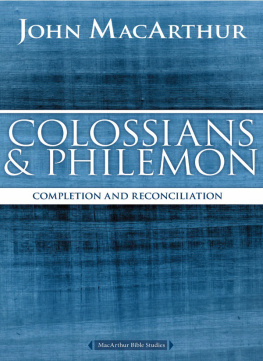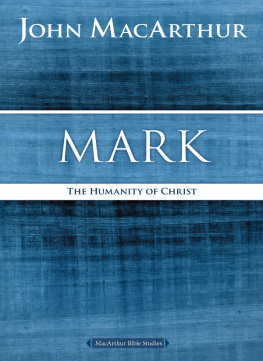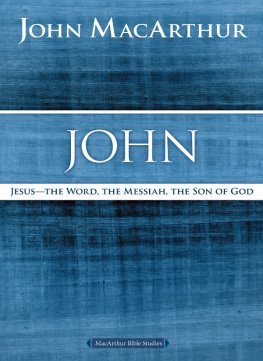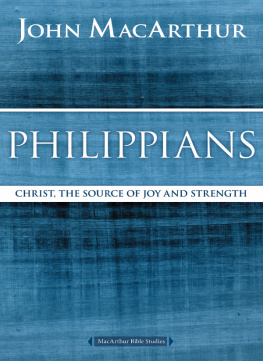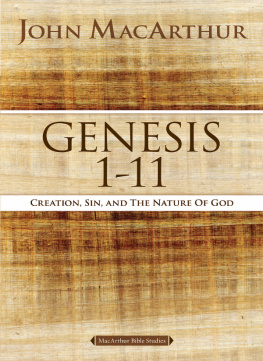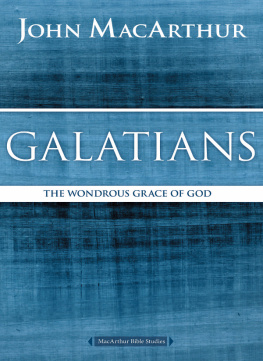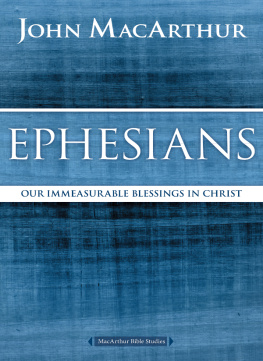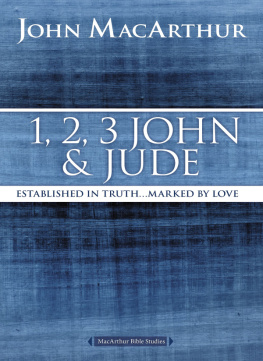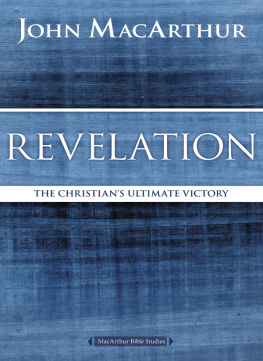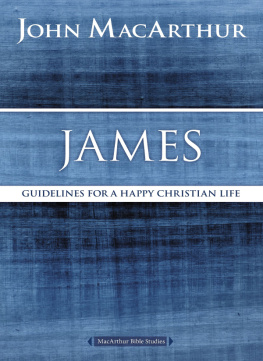ROMANS
MACARTHUR BIBLE STUDIES
2007, John F. MacArthur, Jr.
All rights reserved. No portion of this book may be reproduced, stored in a retrieval system, or transmitted in any form or by any meanselectronic, mechanical, photocopy, recording, scanning, or otherexcept for brief quotations in critical reviews or articles, without the prior written permission of the publisher.
John MacArthur
Unleashing Gods Truth, One Verse at at a Time
Unleashing Gods Truth, One Verse at a Time is a trademark of Grace to You. All rights reserved.
Published in Nashville, Tennessee, by Nelson Books, an imprint of Thomas Nelson. Nelson Books and Thomas Nelson are registered trademarks of HarperCollins Christian Publishing, Inc.
Nelson Books titles may be purchased in bulk for education, business, fundraising, or sales promotional use. For information, please email SpecialMarkets@ThomasNelson.com
Published in association with the literary agency of Wolgemuth & Associates, Inc.
Produced with the assistance of the Livingstone Corporation. Project staff include Jake Barton, Betsy Todt Schmitt, and Andy Culbertson.
Project editors: Mary Horner Collins, Amber Rae, and Len Woods
Scripture quotations marked NKJV are taken from the The New King James Version.
ww1982 by Thomas Nelson, Inc. Used by permission. All rights reserved.
Keys to the Text material taken from the following sources:
Galatians. MacArthur New Testament Commentary Series. 1987, 1996 by John MacArthur.
Published by Moody Press, Chicago, Illinois. Used by permission.
The Gospel According to Jesus. 1997, 1988 by John MacArthur. (Electronic ed.). Published by Zondervan, Grand Rapids, Michigan. Used by permission.
The MacArthur Study Bible (electronic ed.), John MacArthur, General Editor. 1997 by Word Publishing. All rights reserved. Used by permission.
Nelsons New Illustrated Bible Dictionary, Rev. ed. R. F. Youngblood, F. F. Bruce, R. K. Harrison, editors. 1995 by Thomas Nelson Publishers. Used by permission.
Romans. MacArthur New Testament Commentary Series. 1994, 1996 by John MacArthur.
Published by Moody Press, Chicago, Illinois. Used by permission.
Cover Art by Holly Sharp Design
Interior Design and Composition by Joel Bartlett, Livingstone Corporation
ISBN 978-0-7180-3506-8
ISBN 978-0-7180-3525-9 (eBook)
15 16 17 18 19 RRD 6 5 4 3 2 1
CONTENTS
This epistles name comes from its original recipients: the members of the church in Rome, the capital of the Roman Empire.
AUTHOR AND DATE
No one disputes that the apostle Paul wrote Romans. Like his namesake, Israels first king (Saul was Pauls Hebrew name; Paul his Greek name), Paul was from the tribe of Benjamin (Phil. 3:5). He was also a Roman citizen (Acts 16:37; 22:25). Paul was born about the time of Christs birth, in Tarsus, an important city (Acts 9:11; 21:39) in the Roman province of Cilicia located in Asia Minor (modern Turkey). He spent much of his early life in Jerusalem as a student of the celebrated rabbi Gamaliel (Acts 22:3). Like his father before him, Paul was a Pharisee (Acts 23:6), a member of the strictest Jewish sect (Phil. 3:5).
Miraculously converted while on his way to Damascus (ca. AD 3334) to arrest Christians in that city, Paul immediately began proclaiming the gospel message (Acts 9:20). After narrowly escaping from Damascus with his life (Acts 9:2325; 2 Cor. 11:3233), Paul spent three years in Nabatean Arabia, south and east of the Dead Sea (Gal. 1:1718). During that time, he received much of his doctrine as direct revelation from the Lord (Gal. 1:1112).
More than any other individual, Paul was responsible for the spread of Christianity throughout the Roman Empire. He made three missionary journeys through much of the Mediterranean world, tirelessly preaching the gospel that he had once sought to destroy (Acts 26:9). After Paul returned to Jerusalem bearing an offering for the needy in the church there, he was falsely accused by some Jews (Acts 21:2729), savagely beaten by an angry mob (Acts 21:3031), and arrested by the Romans. Although two Roman governors, Felix and Festus, as well as Herod Agrippa, did not find him guilty of any crime, pressure from the Jewish leaders kept Paul in Roman custody. After two years, the apostle exercised his right as a Roman citizen and appealed his case to Caesar. Through a harrowing trip (Acts 2728), including a violent, two-week storm at sea that culminated in a shipwreck, Paul reached Rome. Eventually Paul was released for a brief period of ministry, but he was later arrested again. Paul suffered martyrdom at Rome in ca. AD 6567 (2 Tim. 4:6).
Though physically unimpressive (2 Cor. 10:10; Gal. 4:14), Paul possessed an inner strength granted him through the Holy Spirits power (Phil. 4:13). The grace of God proved sufficient to provide for his every need (2 Cor. 12:910), enabling this noble servant of Christ to successfully finish his spiritual race (2 Tim. 4:7).
Paul wrote Romans from Corinth, as indicated by the references to Phoebe (Rom. 16:1, Cenchrea was Corinths port), Gaius (Rom. 16:23), and Erastus (Rom. 16:23)all of whom were associated with Corinth. The apostle wrote the letter toward the close of his third missionary journey (most likely in AD 56), as he prepared to leave for Palestine with an offering for the poor believers in the Jerusalem church (Rom. 15:25). Phoebe was given the great responsibility of delivering this letter to the Roman believers (16:12).
BACKGROUND AND SETTING
Rome was the capital and most important city of the Roman Empire. It was founded in 753 BC, but is not mentioned in Scripture until New Testament times. Rome is located along the banks of the Tiber River, about fifteen miles from the Mediterranean Sea. Until an artificial harbor was built at nearby Ostia, Romes main harbor was Puteoli, some hundred and fifty miles away. In Pauls day, the city had a population of over one million people, many of whom were slaves. Rome boasted magnificent buildings, such as the Emperors palace, the Circus Maximus, and the Forum, but its beauty was marred by the slums in which so many lived. According to tradition, Paul was martyred outside Rome on the Ostian Way during Neros reign (AD 5468).
Some of those converted on the Day of Pentecost probably founded the church at Rome (Acts 2:10). Paul longed to visit the Roman church, but had been prevented from doing so (1:13). In Gods providence, Pauls inability to visit Rome gave the world this inspired masterpiece of gospel doctrine.
Pauls primary purpose in writing Romans was to teach the great truths of the gospel of grace to believers who had never received apostolic instruction. The letter also introduced him to a church where he was personally unknown but hoped to visit soon for several important reasons: to edify the believers (1:11), to preach the gospel (1:15), and to get to know the Roman Christians so they could encourage him (1:12; 15:32), better pray for him (15:30), and help him with his planned ministry in Spain (15:28).
Unlike Pauls other epistles (for example, 1 Corinthians, 2 Corinthians, and Galatians), his purpose for writing Romans was not to correct aberrant theology or rebuke ungodly living. The Roman church was doctrinally sound, but, like all churches, it was in need of the rich doctrinal and practical instruction this letter provides.
HISTORICAL AND THEOLOGICAL THEMES
Since Romans is primarily a work of doctrine, it contains little historical material. Paul does use such familiar Old Testament figures as Abraham (). Chapter 16 provides insightful glimpses into the nature and character of the first-century church and its members.
The overarching theme of Romans is the righteousness that comes from God: the glorious truth that God justifies guilty, condemned sinners by grace alone through faith in Christ alone. ); the believers responsibility to human government (chapter 13); and principles of Christian liberty (14:115:12).
Next page
